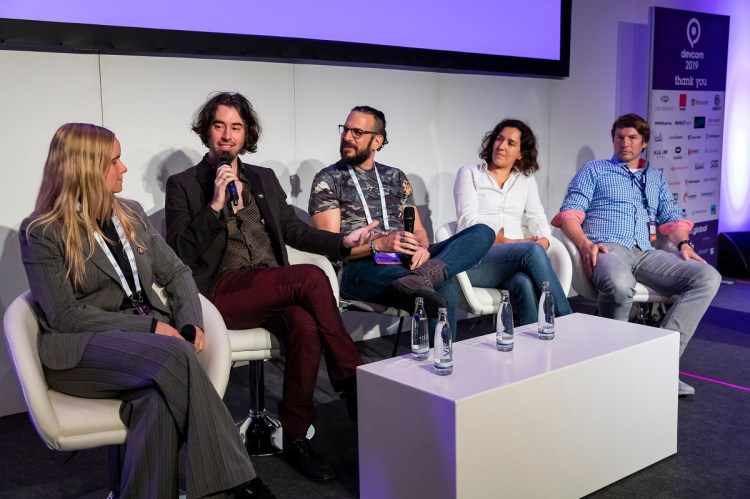It has been a tense and horrifying year of mass shootings in the U.S., with the blame falling on many issues, including President Donald Trump and the guns. Trump himself tried to shift blame to violent video games, which he said led to a “glorification of violence” in mass culture. Although no research supports a connection between violent games and real-world violence, the game industry is on the defensive again. We tackled that subject at Devcom, the recent game developer conference in Cologne, Germany.
The panel was entitled, “The uncomfortable and familiar topic of video game violence.” Most of the coverage of this issue has been pretty thin, but we tried to probe deeper into the issues related to game violence with a diverse panel of game developers who have made different choices about how to depict violence and its consequences.
Our panelists included Timo Ullman, managing director of Berlin’s Yager Development, creator of Dreadnought and Spec Ops: The Line. The latter was notable as a shooter game that brought up the issues of excessive force and civilian casualties in war. Antonia Koop, CEO of Kite Rider Strategic Adventures, also spoke. She is a former war correspondent and now makes immersive training simulations for businesses.
Another panelist was Tsahi Liberman, head of business development and marketing at Simpool. He is also a former soldier in the Israeli army and a designer of games for peace. His team won the UN Prize two years ago for Games for Peace, which connects children around the world in conflict zones and changes their attitudes toward other ethnicities through games.
June 5th: The AI Audit in NYC
Join us next week in NYC to engage with top executive leaders, delving into strategies for auditing AI models to ensure fairness, optimal performance, and ethical compliance across diverse organizations. Secure your attendance for this exclusive invite-only event.
Other panelists included James Portnow, who worked on the Call of Duty series in the past. His credits include FarmVille and League of Legends, as well as the host of a show called Extra Credits. Catharina Bøhler, CEO of Sarepta Studio, which created the emotional impactful mobile game My Child Lebensborn, which was about the children of Norwegian women and German soldiers in the wake of World War II.
Here’s an edited transcript of our panel.
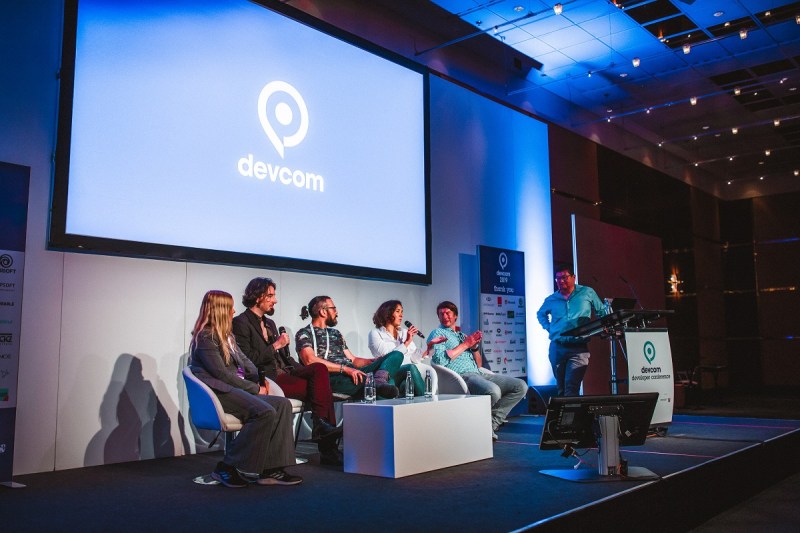
Above: Left to right: Catharina Bøhler, James Portnow, Tsahi Liberman, Antonia Koop, Timo Ullmann, and Dean Takahashi.
GamesBeat: This is a very interesting panel. We did try to invite some people who currently work on Call of Duty, but we couldn’t get them to come for various reasons. I think everyone knows that President Trump blamed the glorification of violence in video games as one reason for mass shootings in the U.S. I think a lot of people in the industry, and a lot of gamers, can see some BS in that, and a distraction from a lot of real issues out there. But the game industry itself did not seem to go on the attack, especially the Entertainment Software Association, which was relatively quiet. I wonder if anybody has an opening thought about this. Was the ESA’s lack of response the wrong thing to do, or the right one?
Portnow: Video games have been under attack since before I got into the industry, just like comic books and rap music. Any new art form is going to be under attack around these kinds of things, so we do have to defend it. But just because we have to defend it doesn’t mean that here, among ourselves, we can’t also admit that we have to do things better. If we’re going to say that games are an art form, that they do impact people, we can’t just say that’s the case when it’s positive for us, when it makes us look good. We have to say that there are better ways to impact people and think about that.
I think the ESA should have once again gone on record and said, “Video games don’t make you violent. We’ve proven that plenty of times.” But we should also have a conversation within the industry about what we can do better to make sure that games don’t normalize violence, don’t create communities of violence, don’t allow for spaces where we harbor people who have violent tendencies.
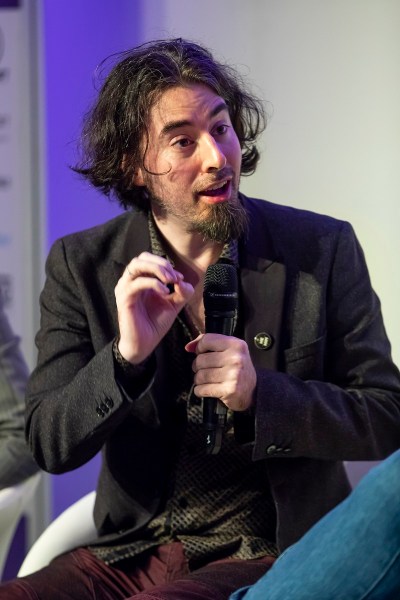
Above: James Portnow, writer of Extra Credits.
GamesBeat: You hit the nail on the head as far as what we want to do where, which is talk about how we can do things better.
Antonia Koop: For me, violence is an interesting topic in terms of depiction in games, because in our work we do use the ability of games to be incredibly realistic — to simulate situations, simulate events unfolding, for training purposes. We replicate reality. We replicate the impact that real experiences have in a safe environment using games technology. That raises the question of, if we can do that — if we can use game technology to create a real learning impact — does the game experience we’re creating for fun also have real impact, and what does that impact look like?
At the same time, as you said, there’s no simple connection. There’s no way that we just play a violent game and then go out and shoot someone, because otherwise most people in this room would have gunned people down by now. So what is that link? What is that impact? What affects how games affect us? That’s the interesting question from the developer point of view.
Bøhler: Can you make sure that there are certain things you do in a game to make people understand that this does have an impact? Just put in something that makes people stop and think a little bit more. A lot of shooter games have done that now, which is great, but we can always do a bit more.
Timo Ullman: The question about impact, how is that going to be driven? Who is going to judge what kind of impact is made? In Spec Ops, it’s a very theoretical approach, because none of us has ever been to war and seen what it does to people. We wanted to take what we’ve seen in other media and get that in a game, to explore the way the road to hell is paved with good intentions. What kind of decisions would you come across, and what would that mean to you? How would it affect you?
At the same time, I remember back then the discussions we had about how we were going to portray the violence in the story. Are we going super over the top? Are we going very subtle? Do we leave a lot of things to the fantasy of the individual player? Because players are such a diverse group, there’s no easy answer to that.
Coming back to the question of our responsibility, in the first place I believe in the freedom of the creator. Then it gets interesting, though. What does the content we create mean to people? How do they perceive this content? That’s a very wide topic, and one that’s very interesting to explore.
Liberman: I’m also in support of the freedom of the creator. Violence itself — I’ve played violent games most of my life, but I’ve been a very peaceful person on the other side of the map. I’ve been in war situations and seen the face of violence and war. As we said before, you’re a changed person when you’re in a violent situation, when you’ve seen that.
As artists, and also in my opinion as educators and narrative creators, it’s our job to show the consequences of violence. It’s not just a bunch of pixels we slay, and then it drops to the floor. It has no name and has no meaning. If I can chop down through hordes of zombies, soldiers, women, children — there’s something there we need to pause on, at specific moments in our narratives and our games. We need to show, “This is what you did. It has consequences.” For good and for bad, but it’s part of our story. If you want to do that you need to raise empathy for the other.
Your enemies are not just — it’s a big word, to say “enemies.” They have families. They’re people like you. Maybe some of them are game developers. In the second Lebanon war, I was a soldier in Lebanon, and I was already a game developer. On the other side, there were people who were game developers like me, from Syria and Lebanon. It’s our job to show that violence isn’t just shooting, mass killing people. It’s part of the story. It’s not only our job, but also those of teachers, to educate from an early age about the consequences of violence and the decision-making there.
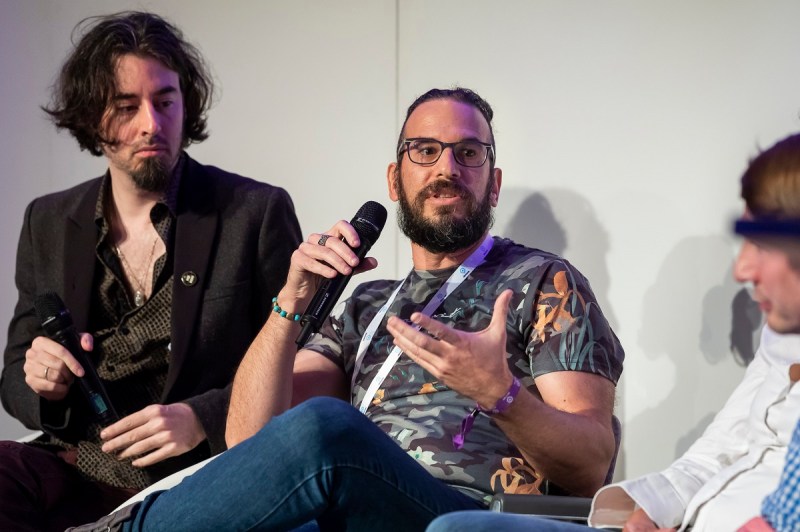
Above: Tsahi Liberman speak at Devcom panel on game violence.
GamesBeat: It’s interesting that a few of you have chosen not to play the game, or you’re choosing to make games that don’t have violence in them — games that are about alternatives to violence, that address serious topics but don’t have that conflict them. That’s one interesting choice. The other is, if you’re going to make a violent game, how do you do it in a way that’s respectful and not exploitative?
Liberman: A game like This War of Mine did that perfectly. First of all, they worked with psychologists. They interviewed people who experienced war, and they tried to portray a very hard situation. I managed to play the game only on my fifth session. For me it was a PTSD situation, seeing one to one what I had seen in war. It was very hard.
But what was amazing for me was that every character I had in my team, in the building that was under siege, had a name. They had a history. They had data. They weren’t just a blank bunch of pixels. If Marina was dead because of decisions I made, that’s part of war — taking very hard decisions, and sometimes seeing them have an immediate effect. People get sick. They die. You make difficult decisions in war, and you need to decide whether you might act against an innocent sometimes. It’s hard to live with that. That’s something I think that game did very well.
GamesBeat: You can be very aggressive in that game. You can choose to steal somebody else’s food.
Liberman: You can choose to steal, but you know what was really effective for me? The expansion, The Little Ones — suddenly I was playing a whole different way. The violence took on a new face because I had a small child I had to take care of. He was asking, “Hey, why are you doing this to innocent people? Why does this man have to die?” I didn’t just need to survive, but my child sees this situation in a specific way. I’m also in the role of an educator and father — not just helping him survive, but protecting him from becoming too traumatized.
Koop: As much as I’m totally with you there on so many levels — I loved that game as well. But driving the entire discussion about violence in video games into a corner where we’re only making peaceful games, or where we’re presenting violence in all its depressing detail, would leave us cornered in a way. An interesting question for me is, how can we use other kinds of media, which don’t have such a depth of storytelling, and still ensure that they don’t drive a particular perception of violence, or a glorified perception?
A critical question for me when dealing with violence, with the imagery of violence — I derive this from my own experience. I used to be a war correspondent, to provide some more background. There are a lot of tools for looking at the framing of conflict parties, for example. Who is it that we’re fighting against? Who is the perceived enemy? One angle that you talked about earlier is, do we have enemies — is there a firm line drawn between good and evil? Is it easy to justify attacking someone else? On a simpler level, how does this other person look?
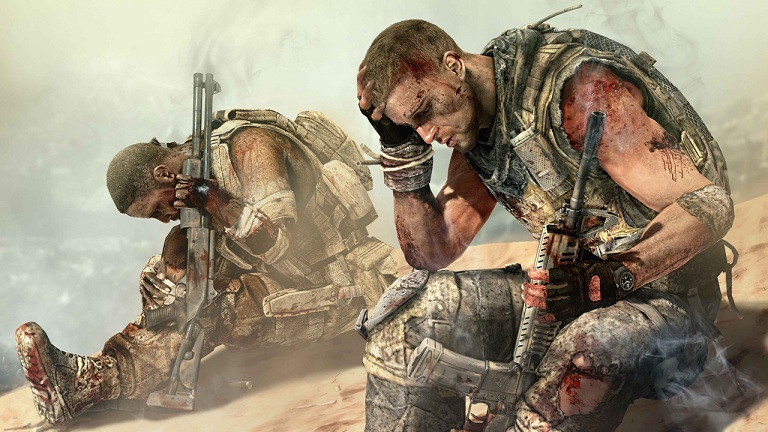
Above: Spec Ops: The Line
Once upon a time, every evil was Russian. Now every evil wears a headscarf and speaks Arabic. What does that do to the general casual narrative we’re making? It’s not about the process of me going out, pulling out a virtual gun, and mowing my way through some adversary. It’s the imagery of who is confronting me, and how these people or these creatures are depicted.
We had an interesting discussion earlier about the representation of monsters in games. I have much less of a problem fighting monsters in a game than I have fighting other humans. When there are other human beings there, we have to think about how we present them, how we present acts of violence against them and their acts of violence against us. What kind of narrative does that create that reaches beyond the game?
Portnow: I have a very specific example to reinforce your point. When the first Modern Warfare came out, I was speaking with the Xbox community team. Before that game came out, the slur “sand n-word” never came up on Xbox Live. It wasn’t part of their list of banned words and phrases. After Call of Duty came out, where most of the enemies are Arabic-speaking, it became the second-biggest slur caught on Xbox Live. Clearly we do have an impact in who we dehumanize and who we present as the enemy.
Bøhler: Does this mean that we can’t make any games that are about fighting a specific war? I guess that’s a challenging question. If it’s problematic that we portray certain people in a certain way, if someone wants to make a game about a specific battle, how do we deal with that?
Portnow: I think that’s the hyperbolic case. I think that takes it to a sort of strawman extreme. Clearly if you present these things in a way that shows both sides — if you’re representing a war from one side, you’re already usually doing it injustice. On the other hand, if you’re never commenting about the impact you have on people — at least on the civilian population of the other side — again, you’re doing it injustice. I don’t think it’s a question of whether we can never make a game about the Iraq war, never make a game about World War II. To me it’s a question of how we present it in a way such that we’re not just using people from a certain culture as generic enemies, and using that war as window dressing.
Liberman: To add to your point, I think we need to stop promoting and supporting as game developers the stigmatization of our enemies. Our enemies are people just like us. There is no actual good and evil, black and white. Our lives are gray. We have people that we fight or cooperate with, but that always serves some type of propaganda. We even see this in the colors in games — red versus blue, things like that. If I can’t see the game from the point of view of the enemy — let me play the other side, and not in a shallow way. I want to play a narrative with the same depth as when you let me play the one side. I think we need to improve that.
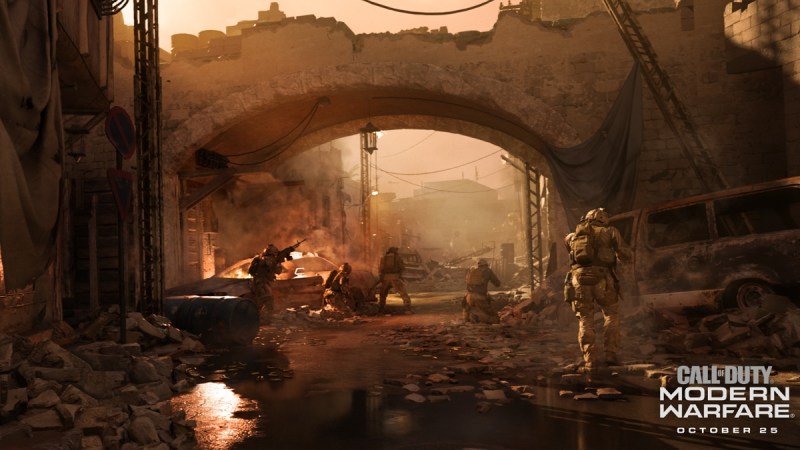
Above: Call of Duty: Modern Warfare
GamesBeat: I remember that America’s Army had two interesting aspects to it. One, you could not play as the opposing side, the “terrorists.” Whatever you were playing, you were on the American side. If you accidentally killed someone with friendly fire in the game, you wound up in prison, the consequence of the wrong kind of violence. They made some interesting choices as far as how they chose to depict violence, although maybe not surprising, given who they were.
The other aspect or challenge or problem here is capitalism and commercial enterprise. Games are driven by supply and demand, like any product. You make games that people want to play. If you stack up all the sales of games for peace on one hand and all the sales of games for violence in the other one, you see what people play.
Portnow: Would you include FarmVille and the Sims and Bejeweled in that games for peace section, though? Because if so, the best-selling games are actually games for peace.
GamesBeat: They could all get hit with that attack phrase, “boring.”
There was a period about four or five years back where I was told, in boardroom after boardroom, that women don’t play games. We have a self-reinforcing cycle. We say violent games sell. Well, violent games sell because we’ve made violent games and pitched them to our audience as what games are. But we’re unsustainable at this point. We’re spending $100 million building games for a narrower and narrower portion of the population. If we want to actually sustain the game industry, we can’t only work on that basis. There’s so much more of the human experience to explore.
Imagine if films were only Marvel. Imagine if books were only romance novels. Nobody else does that. I would argue that from a capitalist perspective, we actually do want to reach the enormous audience that we’re not currently reaching by just building violent games.
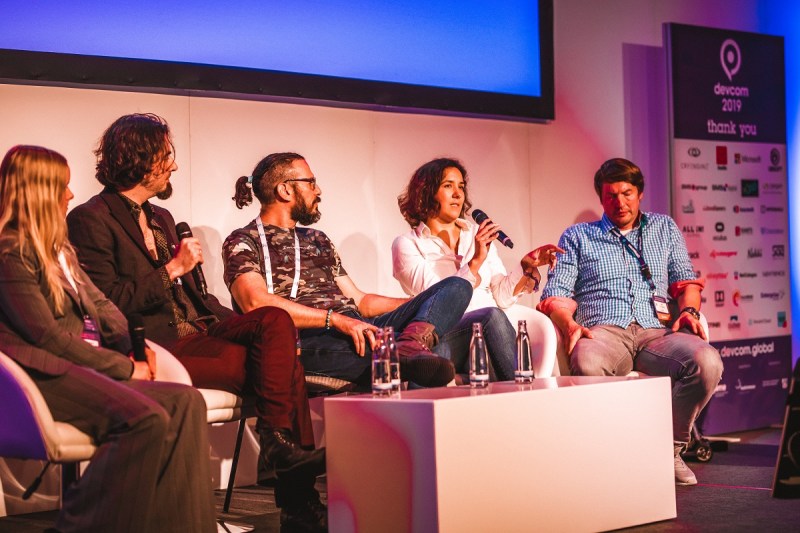
Above: Antonia Koop of Kite Rider Strategic Adventures speaks at Devcom panel on violent games.
Koop: Let me play devil’s advocate, speaking for the business side. I’m technically the wrong person to do this, because our audience isn’t the general gaming population. We’re specialists in B-to-B. But still, it’s an argument I can pick up because I heard it with regard to media reporting, over and over. I tell journalists that you have to look at conflicts in a differentiated way. You have to talk about what’s really happening. Don’t just go for gory scenes, for pictures of the bombing that look the same as the other 250 bombings that you’ve covered before. But then they say, “Well, this is what our audiences want.”
I had that conversation over and over. Looking at media organizations, we have so many of them out there, and they’re all reporting the same shit. It’s just the same. They’re all in a cutthroat competition with each other, but they’re competing only over who gets the same story first. That’s a business opportunity.
Now we’re coming into a zone where games look so good that more and more we can’t just compete on visual quality. So what are we competing on? We’re competing on story. We’re competing on experience. The differentiated view — driving into what’s happening, driving into the motivations of the player — is a business opportunity. It’s differentiation. There’s real business benefit in looking at this.
Ullman: To your point about capitalism, it’s not just the market that’s driving this. Even we as creative people, we’re lazy sometimes. We follow the beaten path. It pays off to be disruptive, to explore, to go about things in a new way. Our industry, over the last decade, has evolved quite a bit. Right now we’re much more diverse. We’re going to see that we also have counter-examples. Not everyone is following the crowd, especially if there’s a lot of financial risk going along with that urge to make the same thing.
I think what we’re going to see — people are going to succeed when they come up with their own stories, their own approaches. We as game developers have a huge toolbox of things we can use to come up with the right experience, the right content that we feel expresses the ideas we have in our minds. We’re going to see that more and more. Following the pattern of how everything needs to be an action shooter, a racing game, a sports game, that doesn’t cut it anymore.
I think we’re also going to see the heavy hitters try to reinvent themselves. It’s an open question as to how successful they’ll be, but there’s a lot of room for disruption, a lot of space for innovation.
Bøhler: Isn’t it a kind of misconception, though, that most games are violent? There are so many games that aren’t violent. You can also ask, is something like Kingdom Hearts violent? It kind of is, but not really?
Portnow: I guess it’s a question of whether something is combat-centric. But on the other hand, well, there are different types of violence, like you said. Do we have to start talking about what kinds of violence are the most impactful, and in what ways?

Above: This War of Mine sees war through the eyes of civilians.
Question: We’re talking about the way games should be in terms of violence. We’ve had examples of games that go against the grain, This War of Mine being one. Timo’s game Spec Ops was a rare example of what we call a triple-A game that actually did something interesting in terms of the way it messaged around violence. But obviously This War of Mine was a small game.
Right now we have this ongoing trend in the media where all of the big companies are trying to distance themselves from the messaging in their games. “Our games are not political.” You have the new Call of Duty game that’s going to have a child soldier level, but they’re saying it’s not a political game. Ubisoft is another example. They’ve done games set in Washington taken over by rebels, games set in a radicalized American state, but they don’t deal with politics. It seems self-evident that they’re dealing with political ideas, but they’re not willing to engage. Does that harm the ability to get to these places you’re going when you have these massive companies with huge reach that can send these messages, but aren’t willing to engage with them?
Portnow: Frankly the answer is just “yes.” Which is very strange to me, because by trying to distance themselves, they create openings for toxic communities who come in and politicize these games in the way that they desire. We’ve seen the negative monetary impact that having toxic communities has in games. But as an industry, we’re all afraid to come out and say anything.
I think that time is near. I don’t think it’s much longer until it’s no longer sustainable to sit back and say that a game that starts out in front of a burnt-out White House is not political. I think we can’t do that, and that as a gaming community we have to start speaking up about it. We have to encourage and reward companies that speak up about it. There are plenty of people out there who want to punish any company that says, “Our game is political.” Those of us who don’t feel that have to write in and say, “This is great. I’m glad you acknowledge that this is political.”
GamesBeat: It would be a bit like Arthur Miller writing The Crucible and saying, “This is not a political statement about McCarthyism, even though that happened just before I wrote this.”
Question: We’ve said that in many cases we want to portray the enemy, to show them with a backstory, to show how we impact them. But when you get into — Doom is maybe a bad example. But that’s a game about glorifying violence, a very over-the-top violence, with heavy metal playing the background. That’s what it’s about. When you have something like that that’s not meant to be narrative-driven, what would you say about that?
Ullman: There’s a big separation there. Context is what matters. I think the commentary wasn’t so much about what we should or shouldn’t be doing, but what you can do. From that perspective, to my mind it’s absolutely okay, it’s great to have a game like Doom that’s just mindless shooting. And on the other hand you can have games like This War of Mine or Spec Ops that try to put violence into a different context. All these things are out there ready to be entertaining or to be explored.
Coming back to what Matthew said, when Spec Ops came out it wasn’t a commercial success. It did all right, but we had much bigger expectations. But by giving the audience more choices, more options, they’ll slowly pick these things up once they’re ready. It paves the way for other games to work in that space. I have to say, kudos to 2K for following through and funding the development of Spec Ops. It wasn’t an easy decision for them back then.

Above: Doom Eternal is bloody fun.
GamesBeat: I’m also interested in what our tolerance levels are for certain kinds of violence. You brought up Doom, and I never had a problem with shooting things in Doom, because it’s a pure fantasy. When it gets more realistic in terms of settings and storyline, that’s when I want it to be more respectful and less exploitative. I wonder if everyone has the same sensibility about this.
There were games I would not play before. The Grand Theft Auto series, for example, I chose not to play for a while because I thought all you could do was be evil. By the time I got to Grand Theft Auto IV and V, though, I felt it was some of the most authentic and artistic storytelling I’d seen in games. I thought it was worth playing even if I was playing an evil person in the game. I could project that. I’m not Trevor. I could pretend that he was doing these bad things, and not myself. There’s a certain kind of tricking my own mind that I can do when playing these kinds of games, and I’m curious what you think about that.
Bøhler: For me it’s a bit difficult, because I don’t play that many shooters. I’m really bad at aiming. [laughs] I only do paint ball and laser tag. But I find this topic is difficult in general because I think most games are good. They mean something to someone. People love them. I feel like you should be able to make things. But at the same time, you can affect people. It’s difficult to know. There’s only one game I thought it shouldn’t be made. Maybe it was Postal. Something like Grand Theft Auto, that’s fine. My only problem I ever had with Grand Theft Auto was, why don’t you have male prostitutes and strippers? But general I’m for it.
I work a bit with education and game development, in Norway. And what we’re not educating students around is an ethical mindset. At least be aware before you start doing something. I think people should be awarded for doing good things. We can make games that improve the world. But it’s a very difficult thing to punish people who don’t make games we think are good.
Koop: I find Grand Theft Auto is a really interesting example, because in Grand Theft Auto, the ethical implications are in some way lessened because you’re signing up for being an asshole. You know it. Everybody knows it. It’s taking a conscious, clear step outside of the norms and values we normally sign on to.
GamesBeat: Which is fantasy.
Koop: Yes, it’s fantasy. There’s a real conscious detachment from your own actions, from your own sense-making process.
Where it becomes a lot more difficult is when you play in a situation, even one that’s detached from your experience — say you’re playing a soldier in a special ops team. This is something that very few people have had as an experience. But because of the narrative that’s built around it, the context that’s given, there is a value judgment between good and bad that’s going on continuously. In that kind of environment, you have to position yourself and relate yourself continuously to the story you’re exposed to. It’s not just a matter of saying, “Okay, now I’ll just go for it.”
There the ice gets much thinner. It eats itself into your sense-making processes. It’s a very sneaky kind of experience, and that’s why there, the duty of care in design is so much more critical. It all goes back to framing. It goes back to, “Why am I here? Who am I? What am I doing? Who are the people I am dealing with in the situation of this game?” The degree to which we show graphic violence is an additional issue in that mix.
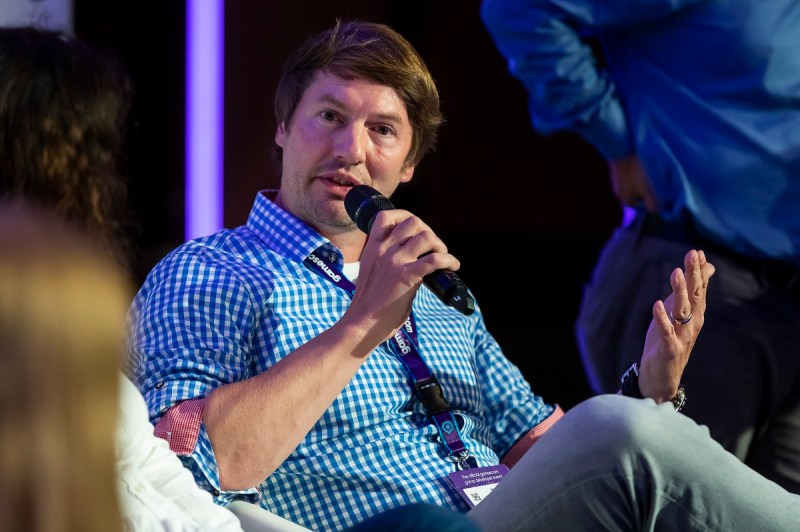
Above: Timo Ullman is managing director of Yager Development, which made Spec Ops: The Line and is making The Cycle.
GamesBeat: There’s another direction we can go with this, which is the degree of realism and the technology that’s making it easier to build extremely realistic games. I’ve heard people say that you should never make a first-person shooter in a VR game, because it’s that much more immersive. It goes to that sense of agency you have in video games. You are doing things, as opposed to watching a movie where you see other people doing things. How much do you think this matters?
Portnow: There is some question to me about this idea that “I” do a thing. If I’m going to a movie, I’m watching an actor on a screen. They’re doing this thing, and I’m reflecting on what they do. In a game, I’m doing it for myself, which opens up two sides. There is a sort of insidious side to that, where you can bring people to believe they’re making choices, when as a game designer I’m really making those choices for them.
On the other hand, it allows us to reflect on our own morality. There is something to a space — and as you said, context is everything — that allows a person in a safe space to explore what their moral system is and what they believe in, even if that means testing out heinous actions. But it has to have that context. For me, perhaps even more than other media, that context is key.
Ullman: To your point about technology, at least in my mind, it’s enabling us more to present realistic things. It’s a vehicle, and it’s getting better and better every day. It’s helping us tell new stories and create more content. I’d be curious to explore a first-person shooter in VR within the realms of how we approach games. But in general technology has advanced so much that it’s really boiling down to the ideas we’re going to explore, the stories that we want to tell, the experiences we want players to have.
Portnow: We use all this technology to create a better and better verisimilitude relative to whatever the experience is. But at the same time, within our community and within our games, we’ll allow for an experience where if you’re playing with a real human being, that person is actively dehumanized. We’re removed from the sense of them actually being a person relative to the people playing with them or against them. It’s why we have people saying things to people in games and online that they’d never say to another human being face-to-face. One of the things we can do is maybe use some of that technology to humanize each other a little bit more.
Koop: I had a conversation with an army that was using to train its soldiers in close-quarters combat using VR. There was a lot of money sunk into the project. It was basically soldiers wearing full VR gear for free movement shooting each other in a VR environment where every other person in the exercise was visible.
They’ve stopped that now, and the reason was not because it wasn’t working, but because it was working too well. The problem was that when you talk to soldiers, any soldier will tell you it’s easy to train to shoot. You learn how to use a gun, learn how to aim, and hit the target. The difficult thing to train into people is when to shoot and when not to shoot. Now, using VR was putting such a level of dehumanization into the mix — of de-realitizing the situation, if you will — that they realized their soldiers were becoming too trigger-happy. They were so desensitized after short sequences of training, because everyone they shot was just another animated character. They said, “We can’t do this. We have to stop it.”

Above: GTA V’s Trevor character.
Question: One thing you’ve talked about is that detachment from a game matters a lot. Doom is one thing because we know it’s a fantasy. You talked about how when we play Grand Theft Auto, we’re signing up to be the asshole. My thought is, we’re playing a role there. What’s important to keep in mind is that the player should be aware of the role they are playing.
I had an interesting discussion with Antonia earlier about how you cannot control what your player is doing inside a game. In some games, especially those that allow you a lot of freedom, you can be certain that at some point or another, one of your players is going to try to massacre every NPC there is, just for fun. Why are they doing it? Well, because they want to role-play the sadist. Why do people kill their family in the Sims? They get something out of that. Does that make them bad people? No, because they have a detachment from it. They’ll probably still feel some kind of regret at killing the family that they’ve put a lot of emotion into, building up those relationships. But at some point they’ll back up their saved game, kill everyone for kicks, load the old saved game, and play with a happy family again.
I guess what I’m trying to say is, it’s okay to allow the player to take on different masks — to play the Nazi and feel the full force of Nazi propaganda, for example — if they’re aware that they’re experiencing propaganda, and they’re made aware in hindsight of what that makes them do. It’s not okay to shove them into a situation where they experience that kind of propaganda and don’t become aware that they’re manipulated.
Liberman: I’d agree. It’s our responsibility as creators to show consequences in our games, depending on the role that we decide to take. If I decide to be a sadist, there’s something that I’ve created as a game designer, a narrative designer, to allow this storyline or side quest to open up for you and for you to understand this role and how it affects your surroundings. In Baldur’s Gate I used to kill everyone for the fun of it, but it has consequences. It affects your surroundings, how the NPCs treat you. People won’t sell you stuff. They’ll pursue you and try to kill you. Changing a role creates consequences, and for me that’s our responsibility.
GamesBeat: There’s a quotation that I like that addresses this in some ways, although I don’t entirely agree with it anymore. Kurt Vonnegut wrote a novel called Mother Night, about an American spy in World War II who became too good at his cover job of being a Nazi propagandist. He was eventually executed for it. The moral of the story is that “we are what we pretend to be, so we have to be careful what we pretend to be.”
I think that applies not only to game developers, but to game players as well. So long as you think about what you’re playing, that’s the best thing to do. You can decide what you will or won’t do, but you should understand what it will do to you if you’re desensitizing yourself, or whatever else results.
Bøhler: Can I just mention one thing about the Sims? I always kill off my family. But it’s more when I’ve gotten to a point when I can’t do anything else in the game. Then I just have to see what happens. But what they do is, if your whole family is dead, it actually gets kind of depressing. There are all these tombstones there, and then time just moves forward very quickly.
The first time that happened, when I was a kid, it kind of freaked me out. But really, the interest was just in finding out what happens. It’s testing out the mechanics. “I wonder if…” They put in mechanics where bad things can happen if you’re not careful. I’m not sure they intended for you to work out that drowning a character in the swimming pool is the most effective way of killing them, but that’s what most players learn.
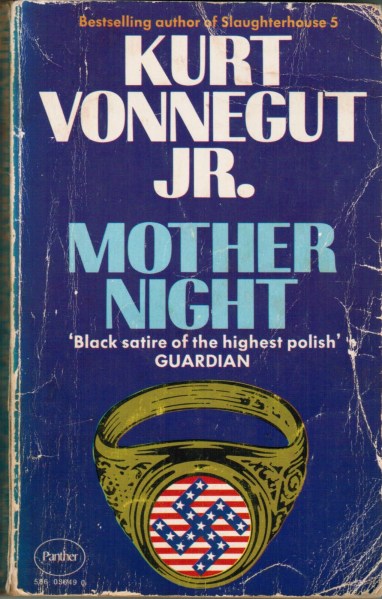
Above: Mother Night
GamesBeat: Then we get around back to the game developer’s responsibility. Do you want to create something that allows people to do this in a game? Do you want to get into the question of agency? As we were talking about in Call of Duty, do you allow the player to choose to shoot the woman reaching for her baby? Do you allow them to not do that, but simply see that as a cinematic, a cautionary episode? That comes up later when you have to shoot a woman reaching for a detonator. If you were able to shoot the woman in the first scene, you’d never reach the lesson of the second scene. How much agency should a game developer give to the player?
Portnow: I don’t think it’s a problem of agency. Again, I think it’s a problem of context. Allowing any of these choices isn’t the fundamental problem. Getting the player to introspect, getting the player to reflect on these choices, that needs to happen. Unless the game developer themselves does that introspection, it doesn’t happen.
Question: Antonia has mentioned this already, but this is happening in the U.K. at the moment, that the government are getting very excited with various committees investigating immersive and addictive technologies, which includes games. The issue that they’re getting at and trying to get the games industry to admit to is, do game developers, just like Facebook and other technologies, have a duty of care to their users or their players? Not just around addiction, but a duty of care generally around whatever they’re designing into their games, if it might cause users or players to do bad things or get into bad ways. Game developers don’t have that duty at the moment, but I think that’s going to come, possibly through legislation on a national basis. But the question is, do game developers have a duty of care to their users?
Bøhler: I feel that they do, especially in light of something James talked about earlier when we were chatting. The only problem is, at some point does that become censorship?
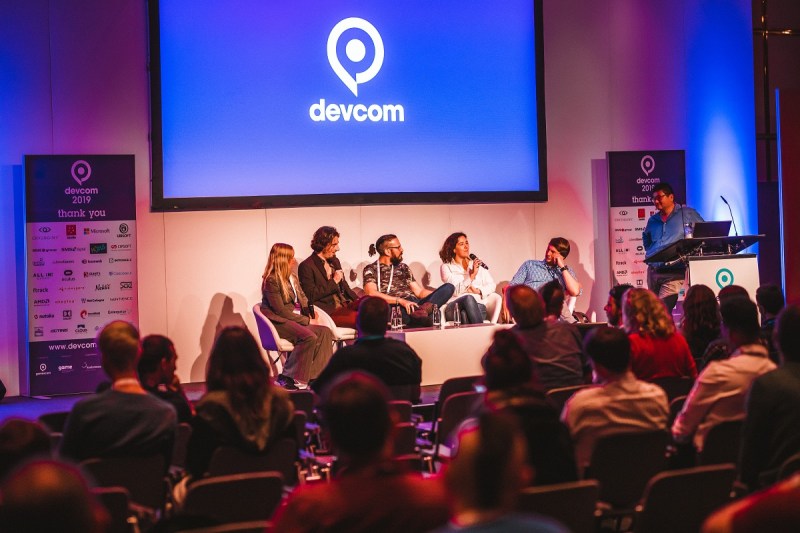
Above: The violent games panel at Devcom drew a sizable audience.
Portnow: To me, we have a moral obligation. Screw the government. The government shouldn’t have to be involved in this. As a game developer, I would never make a game where, say, the protagonist is a KKK member. Whether we’re talking about addiction or extremist themes or acts of violence, we as game developers should be thinking more about these things and what they mean. Before the government steps in, we should be having this discussion as a community and deciding that there are things we want to do to take care of our players as moral human beings.
Koop: I have a food analogy. As an industry we’re in a bit of a situation like the food industry. We have a lot of companies out there that sell us something that’s supposed to contain nutrition, but at the end of the day they save a lot of money by putting a lot of sugar and a lot of salt in there. As an industry, do you say that the food industry has a duty of care? That they shouldn’t sell us things that make us fat, unhealthy, gives us a heart attack, whatever? It’s difficult to regulate that, especially because for everyone, the impact of different kinds of intake are different. It’s a messy question.
On the other hand, the industry tends to drive toward the lowest common denominator. Sugar gets to a point where we end up with a sugar tax in the U.K., so we switch to artificial sweeteners, which also aren’t particularly healthy. We have to avoid ending up in a similar cycle. We can’t be blamed for violence just as the food industry as a whole can’t be blamed for obesity, but we’re having an impact. It’s our choice to say that we don’t want to sell rubbish. We don’t want to sell things with a cheap negative impact. We want to look at selling something that’s nutritious, that’s valuable, or at least not damaging. There might be the occasional snack binge that we can take on the gaming front, but overall we want to take responsibility and make something that’s worth consuming.
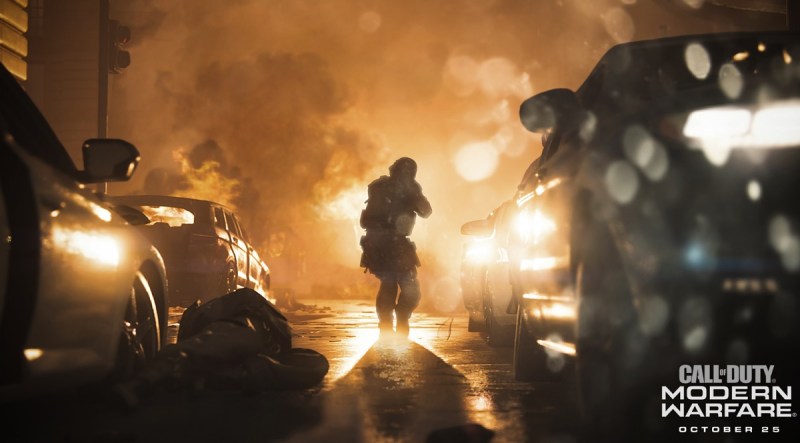
Above: Call of Duty: Modern Warfare
GamesBeat: Sometimes market forces work. Postal isn’t the number one selling game every year. Call of Duty usually ends up being that game, and it’s a more respectful game than Postal. The market has at least spoken on that subject. The market doesn’t necessarily reward games that repeatedly do bad things to consumers. Loot boxes are possibly leaving the industry now because of market forces, as people complain about them more and more. Maybe that’s going to work better than regulation.
Bøhler: This is another comment about food, but maybe I think there’s another comparison there. I don’t know about Germany, but in Norway, for instance, suddenly — I don’t know how this happened — people became very aware of palm oil, where it comes from and what it does, both to your body and to the environment. It’s very bad for the world in general. Suddenly it became very unpopular to buy foods containing palm oil. It became this pop thing — like, you’re not cool if you buy this crap. Some food brands suddenly became super popular because they just said, “It’s cheaper to use this, but screw it.” The shops had posters outside: “We have food without palm oil.” It became a trend, so maybe we can find a way to do the same.
Question: I feel like a lot of the problem we have is awareness, the way you talked about how players should have awareness. I feel like that’s important for the education of players. My problem is, when parents buy games without looking at the content in them, and just letting them grow up on that — I believe that parents have a responsibility to educate their children. While we as a games industry, yes, we should make better games, but we shouldn’t be limited in the things we can and can’t make because our players aren’t being educated. I don’t know if you would agree with that or not.
Portnow: I just came from Serious Play, where I talked a lot with educators around this kind of thing in the United States. One of my biggest themes is, play games with your kids. If you have a television and you just sit the kid in front of it, they’re going to watch crap and they’re not going to get much from it. But if you sit with them and talk about their favorite TV shows, they’re going to get a lot from it. The same is true of games. We should be doing more with our brothers, sisters, nieces, nephews, children to make an environment where people get the most from the games they play.
That said, while I agree with you that we shouldn’t be in any way legally limited or censored in what we build, very often people use this idea that we should be free to excuse themselves from the morality of creating bad things. Even though we’re free to do whatever we want, I still say that we should do more, and we should communicate more with parents and other people who say they don’t play games about how to have conversations around games with people in their lives.
If you just have that conversation with a kid, even if you don’t play Fortnite or Madden or whatever it is, there’s a remarkable amount you can learn just in letting a kid talk about their interests for 15 minutes. You can help them learn. I was just talking to a group of kids in a classroom and they started talking about Fortnite. Two minutes in it became a conversation about communication, about teamwork, about all these other things. It doesn’t even matter that it’s about a game, as long as we have that conversation. We as an industry can do more to help people have those conversations.
Bøhler: I was actually hired by the Norwegian government to teach eighth-graders about games. First we just go through the typical games that they know of, and they sit down and analyze them a bit based on what I’ve said. Then we go on to the games I like, which tend to be more art, and they ask, “Is that free?” And I say, “No.” Toward the end, though, I tell them, “Okay, now it’s your turn to make a game.” That’s really interesting, because some of them just make up something silly — “You put a coin up your butt!” — but some of them, for example, talk about making a game about depression. There are a lot of things going on there.
What I realized, though, after about four years of giving the same talk, is that it’s the teacher sitting in the back that learns the most. It’s good to do that same kind of educational thing for adults. “This is what games are.” You only need two or three hours, and after that people understand that there’s more to it.

Above: Call of Duty: Modern Warfare. Soldiers stack up as they enter a house.
GamesBeat: Talking about parents, Call of Duty is once again an interesting case, where it’s been Mature rated for the whole history of the game, but I know a lot of parents, a lot of families who let their young kids play that game. They see no consequence to that. They’ve come to trust that brand as a brand they can allow their young kids to play without worrying about real consequence it. Because it’s so trusted, it’s almost as if the developers have historically designed for that, rather than what they’re doing this year, which I don’t feel good about — that they’re pushing Modern Warfare toward a violent edge.
Normally I would say it’s not necessarily a big problem that kids are playing Call of Duty. This year I think it is.
Liberman: My answer to that would be that it’s the responsibility of parents and educators to really get that across. You can have a violent game, but if you educate the people playing it, if you show them that it’s just a game and what you do in the game is something that isn’t something you’d do in real life, then they’re much more aware of the difference there.
Ullman: I’d agree with that. Games aren’t able to fix things that have gone wrong in the education and the upbringing of children. I’m a father of two kids as well. I make sure that they’re growing up with content I feel that’s good for them, that they’re ready to consume. But we shouldn’t rely on the fact–there are areas and territories where youth protection isn’t playing such a big role as it does in Germany. In Germany we have a tendency to rely on the state and the state takes care of us. We have very strict youth protection, and in most cases that’s a good thing. But we all grow up in many different cultural backgrounds. You should be able to do what you want to do within the limits of the market and society. We should be free to explore the ideas we have and offer new concepts, new content, new stories, and new experiences.
Portnow: But that just excuses us of responsibility. It’s easy to push that responsibility onto other people. Fundamentally, who here has ever had a meaningful experience in a game? That’s basically everyone here, which means games can affect you. We have to accept that, because if we accept that they can affect you in a positive way, we have to also accept that they can affect you in negative ways. If that’s true, then–yes, I agree with you that we shouldn’t be censored. But as developers, it should also be our goal to make the thing that makes the world a better place, to make a piece of entertainment that’s simultaneously the most engaging and yet also gives something to somebody when they get off the couch or turn off the screen that’s not detrimental to them.
Ullman: It’s a very nice goal. I wouldn’t say that we shouldn’t be aware of the consequences and the responsibility that we have. I would not necessarily say that we should have as our goal to make the world better. There are so many experiences to play, so many stories to tell — every time it’s in the eye of the beholder. Where does this get us? You and I might disagree on whether something is a good idea or a bad idea. That’s why I think there’s a slippery slope in saying we should make the world a better place. You and I might have different ideas of what that world would be.
Portnow: But it doesn’t matter if we have different ideas about it so long as both of our goals are to make the world a better place.
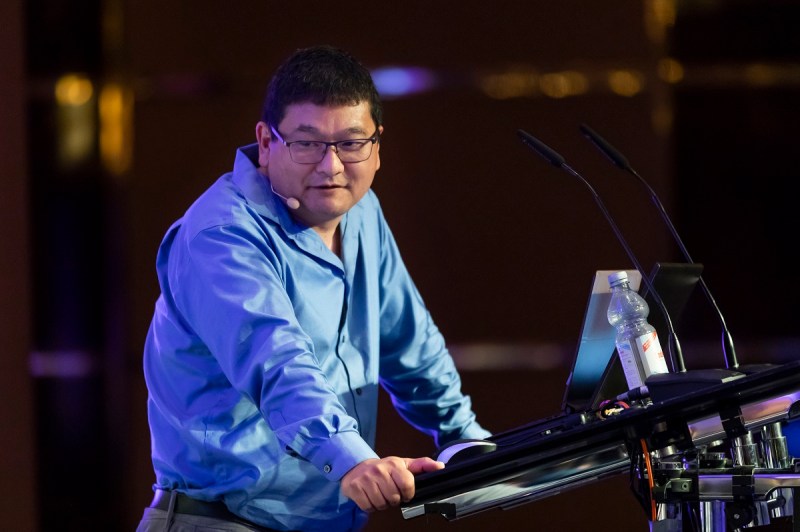
Above: Dean Takahashi, lead writer for GamesBeat at VentureBeat, moderates violent games panel at Devcom.
GamesBeat: What was it you said, about how the road to hell is paved with good intentions?
Question: What do you think companies can and should do to combat toxicity in their communities, if indeed they do make violent games?
Portnow: You’re asking this with two minutes remaining. [laughs] I have a lot to say on this, so I’ll sit back on this one.
Koop: I have one remark in this direction, which also goes back to the previous question. Giving kids a game like Call of Duty and telling them that it’s all not real doesn’t make a difference. The impact it has on a brain that’s not fully formed, on a personality that hasn’t yet been shaped, is there regardless. Let’s say we have a 12-year-old playing a shooter in a high state of adrenaline. They’re impacted by that experience, regardless of what their parents say about it.
There’s a decision to be made, either about restricting gamers, which we can’t do as developers — every 12-year-old knows how to get around age restrictions — or about how to get a message across as far as why games are age-rated in a certain way, and why certain games shouldn’t be accessible to younger generations. It’s about communication and collaboration with parents and with our players. That’s really key.
Question: I’m not so much talking about children, though, as I’m talking about bad adults.
Portnow: All right. The truth is, have some fucking guts. The truth about this is, there are two sides to it. Side one is, we as an industry, a consumer capitalism-driven industry, have very often said that a consumer is a consumer. We’ve never asked the question, “Do we want all these people to be consumers?” Are there sections of this community to which we should say, “No, we don’t want you buying our game?”
To me, the answer is actually yes. When you have those toxic, misogynist, bigoted communities as part of your game, it makes the experience worse for everyone. Even from a monetary perspective, we know toxicity makes you sell fewer units. Someone brought up talking about politics in games. We have to say, “All right, these things are not okay.”
But we also have to deal with the flip side. The other important side is finding more ways to encourage and reward good behavior. We just accept that good behavior is the norm in most games, and so good behavior will go un-called-out, while bad behavior gets you punished. Toward those people we act negatively. We entrench and reinforce. But if we do more with our games to call out all the times we see a good or positive act — we can track that almost as well as we can track negative behavior. We can do a lot more to reward the player for doing good. I would never design a game that strictly punishes you, and yet that’s how most of our social systems work.
Disclosure: The organizers of Devcom paid my way to Cologne. Our coverage remains objective.
